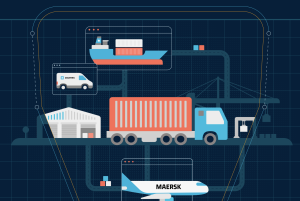 Technology drives innovation and can mitigate risk in the supply chain. In recent years the integration and globalisation of supply chains has improved efficiency, but has driven complexity and vulnerability to the point of disruption. Advances in SCM technology offer a solution, Tech-Pro Personnel tells SmartProcurement.
Technology drives innovation and can mitigate risk in the supply chain. In recent years the integration and globalisation of supply chains has improved efficiency, but has driven complexity and vulnerability to the point of disruption. Advances in SCM technology offer a solution, Tech-Pro Personnel tells SmartProcurement.
Technology has revolutionised supply chain management: from the advent of the PC to the rise of specialised software applications – Enterprise Resource Planning (ERP), Transportation Management Systems (TMS) and Warehouse Management Systems (WMS) – and, more recently, the introduction of cloud-based solutions aimed at providing a ‘single view’ of the supply chain.
Over time, technology has played a leading role in improving visibility, facilitating collaboration, supporting sustainability and driving innovation in the supply chain.
The rise of ‘big data’ – defined by Gartner as ‘high-volume, high-velocity and high-variety information assets that demand cost-effective, innovative forms of information processing for enhanced insight and decision-making’ – has ushered in a shift from the ‘age of information to the age of foresight’.
Respondents to Barloworld’s supplychainforesight 2013 acknowledged the challenge posed by big data, with 86% ranking ‘improving the flow of business intelligence between the business’ – or analysing and interpreting information to create real business intelligence and improve decision-making – as a leading supply chain objective.
Benefits of supply chain management technology
The benefits offered by supply chain technology have been recognised by business, with 42% of respondents to GE’s Global Innovation Barometer 2013 listing mastering technology development as a key factor in successful innovation³, while 87% of Barloworld’s survey respondents stated that ‘investing in supply chain management and systems enables business success’.
Benefits include:
• Increased sales and revenue. As an example, demand planning software has improved demand forecasting, enabling supply chains to refine product availability, leading to increased sales, reduced costs and higher customer service and satisfaction levels.
• Improved competitiveness. Technology can offer competitive advantage.
Walmart uses technology to generate higher profit margins than other discount retailers by decreasing costs and improving efficiency, while lowering prices.
• Lower costs. Improved transparency both up- and downstream in the supply chain can lead to significant savings in inventory, processing, transport and labour costs.
• Reduced risk. Software facilitates contingency planning against disruption and can improve adherence to compliance standards, mitigating risk.
While the pitfalls of implementing supply chain software – which include a lack of executive management support, poor requirements definition and interference with forecasting results – can hamper success, the benefits are tangible.
The future
Research indicates that technology will continue to have a significant impact on supply chain management, improving efficiency, reducing complexity, driving innovation and mitigating risk.
Predicted advances include:
• The continuous upgrade of technology. Key advances in supply chain management software are expected to offer improved capabilities in demand intelligence, integrated planning and execution, partner integration, ‘on-demand’ supply chains and SOA architecture.
• Big data and the ongoing rise of predictive analytics. The explosion of available data will drive the need for better predictive analytics. According to a Bloomberg Businessweek survey, ‘companies are using business analytics to a much larger degree to aid decision-making’ with those who ‘use analytics more extensively believing that it improves performance’.
• Consolidation of fragmented software vendors in pursuit of the ‘single view’. Gartner predicts that the fragmented SCM software market will consolidate into a small number of vendors offering a fully integrated suite of SCM solutions.
• Africa will leapfrog other regions in technology adoption. Barloworld’s research indicates that Africa’s unique circumstances and needs will see the region leapfrog others in the deployment of the latest SCM technology.
How has SCM technology improved your supply chain? What technologies do you expect will make an impact going forward? We’d like to hear your views – join our discussions on LinkedIn


























